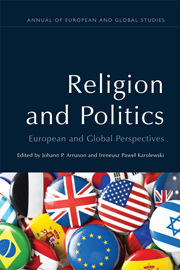Book contents
- Frontmatter
- Contents
- 1 Introduction
- 2 The Religio-political Nexus: Historical and Comparative Reflections
- 3 Politics and Religion in a Global Age
- 4 Comparative Secularisms and the Politics of Modernity
- 5 Europe in the Global Rise of Religious Nationalism
- 6 The European Union's Civil Religion in the Making?
- 7 Democracy, Secularism and Islam in Turkey
- 8 Orthodox Religion and Politics in Post-Soviet Russia
- 9 Religion and Politics, Church and State in Chinese History
- 10 Religion and the State in Contemporary Japan
- 11 Arab Revolutions and Political Islam: A Structural Approach
- 12 Beyond Post-secularism: Religion in Political Analysis (Review Article)
- Notes on the Contributors
- Index
6 - The European Union's Civil Religion in the Making?
Published online by Cambridge University Press: 05 September 2014
- Frontmatter
- Contents
- 1 Introduction
- 2 The Religio-political Nexus: Historical and Comparative Reflections
- 3 Politics and Religion in a Global Age
- 4 Comparative Secularisms and the Politics of Modernity
- 5 Europe in the Global Rise of Religious Nationalism
- 6 The European Union's Civil Religion in the Making?
- 7 Democracy, Secularism and Islam in Turkey
- 8 Orthodox Religion and Politics in Post-Soviet Russia
- 9 Religion and Politics, Church and State in Chinese History
- 10 Religion and the State in Contemporary Japan
- 11 Arab Revolutions and Political Islam: A Structural Approach
- 12 Beyond Post-secularism: Religion in Political Analysis (Review Article)
- Notes on the Contributors
- Index
Summary
Introduction
There has been a long debate over the role of religion in the public sphere (for instance Bellah 1967; Coleman 1970; Casanova 1994; Norris and Inglehart 2004; Habermas 2006) as well as over the secularisation and (de)privatisation of religion in Western societies (for instance, Taylor 2007; Calhoun et al. 2011; Putnam and Campbell 2012). In this and other debates, the relationship between religion and politics has been often conceptualised as a dichotomous one, whereby these two spheres (the sacral and the political) are viewed as easily distinguished and analysed as separate sectors of a modern society, whereby only their configurations are subject to change. Against this background, scholars explore for instance the impact of organised religion on nation-building and national identity (Jakelic 2010) or develop normative ideas about religious incorporation into the political life of democratic societies (Bader 2011).
In contrast, this chapter argues in tune with S. N. Eisenstadt's perspective (2005: 161) that religion should not be equated with the sacral, since many central dimensions of modern states are deeply rooted in the religious components of modern civilisation, even though in a modified form and frequently with a different appeal to legitimacy and ethos. In this sense, basic social functions of religion (such as strengthening of collective bonds, promotion of collective solidarity and social control through participation in collective rituals) are transformed and can function in secular terms, as they are often constitutive of political ideologies and without straightforward religious references.
- Type
- Chapter
- Information
- Religion and PoliticsEuropean and Global Perspectives, pp. 97 - 114Publisher: Edinburgh University PressPrint publication year: 2014

